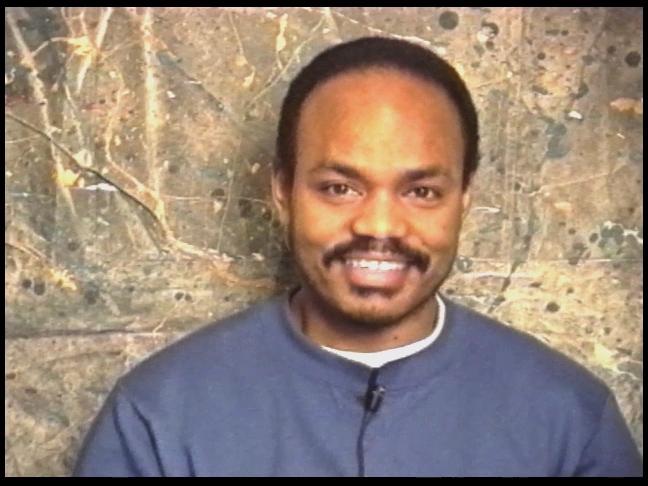Monday, February 08–Wednesday, February 17
Gene Siskel Film Center Virtual Cinema
Closed captions available
Conversations at the Edge presents two works from Wendy Clarke’s extraordinary One on One project (1991-94), a revelatory series of video dialogues between inmates at the California Institute for Men in Chino, members of the Church In Ocean Park in Santa Monica, and a group of Crenshaw residents in Los Angeles. Presented in partnership with SAIC’s Video Data Bank.

Since the early 1970s, artist Wendy Clarke’s visionary body of work has used the video camera as a revelatory tool for communion and self-reflection. While she’s best known for the Love Tapes (1977–2011), an unprecedented, decades-long series in which she recorded more than 2,500 people around the globe reflecting on their feelings about love, she produced a smaller but more logistically complex project in the early 1990s. Titled One on One, this work took shape as a series of video dialogues between inmates at the California Institute for Men in Chino, members of the Church In Ocean Park in Santa Monica, and a group of Crenshaw residents in Los Angeles. Throughout 1992, 15 pairs of people exchanged video letters facilitated by Clarke, never meeting in person or otherwise communicating. The resulting year-long conversations offer profound observations on relationships, race, vulnerability, and the psychic and social effects of incarceration, while forging new bonds of support between people in and outside prison.
—
One on One: Ken and Louise
February 8–14
Gene Siskel Film Center Virtual Cinema
Closed captions available
In this profound and moving tape, Ken, a restrained but confident songwriter and vocalist, exchanges tapes with Louise, an upbeat but somewhat distant woman. As described by the scholar Michael Renov, “With each tape exchanged, their emotional intimacy gathers greater force. Ken writes and sings a song to Louise . . . . In reply, Louise shares . . . her secret self. And it is through the incitation of the video medium that so powerfully fuses distance and intimacy that this cathartic pas de deux is effected.”
Wendy Clarke, 1994, US, color, sound, 79 minutes
—
One on One: Arnold and Ahneva
February 11–17
Gene Siskel Film Center Virtual Cinema
Closed captions available
In this tape, Ahneva, a fashion designer and cultural worker, exchanges tapes with Arnold, a father, former restaurant owner, and talent show producer struggling with many burdens. “I’m trying to extend myself to you through this tape so that you can pick up on some good energy,” Ahneva declares at the start. The two connect through a discussion of Black brotherhood and sisterhood and the reverberating impact of mass incarceration on Black families and communities. As their relationship deepens, they touch on drug addiction, sexuality, and identity, while inspiring each other through their creative aspirations and dreams.
Wendy Clarke, 1991, US, color, sound, 47 minutes
—
RELATED EVENT
Wendy Clarke in Conversation
February 12, 2:00 p.m. CT
Gene Siskel Film Center Virtual Cinema
Live captions available
—
ABOUT
Wendy Clarke began her career as part of Tee Pee Video Space Troupe (1969–75), conceived by her mother, the experimental filmmaker Shirley Clarke. In the years since, she has produced numerous large-scale interactive video installations, projects, and tapes, including the Love Tapes (1977–2011), Video Rotation (1983), The Link (1984), and One on One (1991–94), among many others. These projects have been broadcast on public television throughout the US and exhibited in institutions and events throughout the world, including the Museum of Modern Art, New York; Wadsworth Athenaeum Museum of Art, Hartford; Anthology Film Archives, New York; World Trade Center, New York; Walker Arts Center, Minneapolis; Exploratorium, San Francisco; Kennedy Center, Washington, DC; Mondial du Theatre, France; Rio/Fest, Brazil; Ambulante Documentary Film Festival, Mexico; Whitney Museum of American Art; the Winter Olympics in Lake Placid; and Artpark in New York, among many others. She has been the subject of recent retrospectives at Anthology Film Archives, Filmforum in LA, the Museum of Art and Design in New York, and at LUX in London. In addition to her art practice, Clarke is a trained art therapist and Tao cultivator.